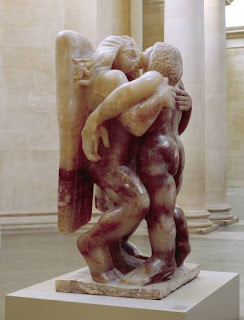Art in Lent 1: Wilderness
Jacob and the Angel: Jacob Epstein, 1941
Depicting a mighty struggle, it stands nearly 7 feet tall. The translucent qualities of the stone give a depth to the piece, as if one is able to look through the flesh to the structures beneath – the muscles and sinews that strain and pull the other figure into their grasp. Some critics see this as a representation of the struggle that the artist, himself a Jacob, had with his materials – in this case a 2½ ton block of flawed alabaster. Other view this as a comment on Epstein’s Jewish race – he came from Polish immigrants - and particularly their struggle at the time when this was carved.
Epstein has not depicted a gentle angel, a guardian or messenger. This is the moment spoken of in Genesis (Genesis 32: 22-32), when Jacob wrestled with a man until daybreak. In Hosea this man is identified as an angel.
At the time when this happened Jacob was afraid for his life. Esau, the brother that he had tricked out of his birthright, was coming to meet him after many years. As so many times before, Jacob’s reaction was to scheme and plot. He had surrounded himself with the accumulated wealth of the intervening years – the wives and children, the flocks and herds and servants. Now he chose to separate himself from them, and to wait alone in the darkness. And in the darkness a figure came towards him.
The Bible says that Jacob and the man wrestled. There were no blows struck, until the final moment; nor were any weapons involved, other than the strength and cunning of their own bodies. This mimics the birth of Jacob when, following an uncomfortable pregnancy for Rebekah – whose children ‘struggled together within her’ - the younger twin was born clinging tenaciously to the heel of his more passive brother. Despite a mismatch of strength between Jacob and the wrestling man, he refused to yield; and so they wrestled on until daybreak.
Epstein’s angel is no ethereal creature, born of air and light. This is a solid, unyielding figure. The wings are more like the tablets of the commandments than flesh and feathers. Many other artistic interpretations of this account have Jacob warding off the blows of a near-triumphant angel; or else they seem to waltz together in an unending dance. This is a fully-committed wrestle, with both parties sweating and striving for victory. And yet, it is obvious that the angel is holding back; he is not standing tall, but instead is bending his knees to accommodate Jacob’s inferior height. If he were to stand straight, he would instantly lift Jacob off his feet. As it is, this grasp mimics a fierce hug, one which threatens to squeeze the breath from the lungs even as it comforts and protects.
What was it Jacob wanted when he left his family and walked out alone? He had met with angels before, and had received comfort and guidance from them; maybe he sought such comfort again. Perhaps he had no idea that he would meet with God, but needed space and time to consider the next step in his ongoing battle with his brother. Perhaps he felt some guilt for the birthright he had stolen, and with the evidence of his accumulated wealth surrounding him had found it difficult to breathe. It seems unlikely that he expected an adversary, one who would match his strength but not exceed it.
And what of God’s motive? Was the intention to destroy Jacob, or embrace him? In matching his strength to that of a mortal man God deliberately comes in the guise of a human being, with all their frailties and limitations. There is never any doubt that God will win the fight; but he seems to do so by reverting to dirty tactics, leaving Jacob the trickster looking like the fair fighter. It seems only right that Jacob should demand of such a God his birthright – the blessing of God. Yet when Jacob asks the name of his adversary, he is refused. God, not Jacob, is in charge; and Jacob is put in his place, even as his rightful place as the heir of Isaac – a position first won dubiously, now granted by God as a right reward for his tenacity – is granted.
There are moments in our lives when we consciously carve out time to be alone with God; in contrast there are moments when we find ourselves alone and bereft, with none but God to turn to. Both of these can be thought of as wilderness experiences, and in these God may seem especially present or very far away. The conclusion of such an experience can seem ambiguous; in the midst of desolation, what did we really learn of God?
Perhaps the message we most truly learn is that, in his engaging with us, God never becomes less than himself; and that this being is not ours to command. At the end of his encounter Jacob gains a blessing, and that blessing goes with him into the next stage of his journey: yet still he does not learn the name of God. As Moses will discover in the years to come, even Israel cannot know the essence of God’s being, but must simply be content to know that ‘I am who I am’.




Comments